

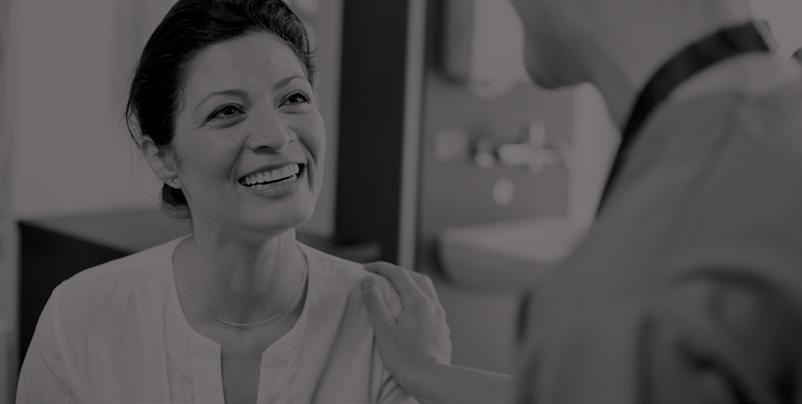
1 Letter from Founder and Chairman of the Board 2 Back on the Books 4 Katie’s Story 5 Back on the Books Influencers 6 Multi-Cancer Early Detection 7 Prevent Cancer Advocacy Workshop 8 Research Grantees 10 Technical Fellowships 11 Global Grants 12 Community Grants 14 Think About the Link 15 Too Young for This Sh*t 16 Action for Cancer Awareness Awards 17 Awesome Games Done Quick 18 Prevent Cancer Dialogue 19 Quantitative Imagining Workshop 20 Prevent Cancer Annual Gala 22 Donor Spotlights 24 Beneficiary Events 25 Foundation in the News 26 Social media | Breast Health Education 27 preventGEN 28 Board of Directors 29 Senior Staff 30 Medical Advisory Board 31 Scientific Review Panel 32 Believe we can 33 Ways to give
Dear Friends,
How are we making an impact on the world around us?



That’s the question we’ve been asking ourselves at the Prevent Cancer Foundation. The past two years have been a turbulent time around the world; at the Foundation, we used this as a time of reflection. We want to be sure we are spending your dollars to make the biggest impact we can on cancer prevention and early detection, through our research, community and global grants; our education campaigns; our conferences and events; and so much more.
That’s why we are proud to introduce our first-ever Impact Report. No longer an annual report detailing Foundation activities, the Impact Report tells the story of what we are accomplishing together with your contributions and support.
As we embark on exciting plans for the future, we hope to one day tell the story of a world where no one dies of cancer. Thank you for being our partner as we write the next chapter.
Sincerely,
Carolyn Aldigé Founder and CEO
1
As more Americans are vaccinated against the coronavirus, their comfort in going to the doctor and dentist is increasing—but many people still need to reschedule routine cancer screenings. They could be lifesaving! But the third Prevent Cancer Foundation Back on the Books survey shows mixed results for long-term cancer prevention.
Some Americans are going back to their doctors, and we saw a decline in the number of older Americans who missed, postponed or cancelled appointments (34% in December 2020 to 28% in May 2021). But to start with, a significant proportion of adults (27%) are unaware of what cancer screenings are recommended for them— and an even higher number (39%) are not planning to go to future screenings. Minorities were even less aware of what screenings they need than their white counterparts.
The new survey released by the Foundation was fielded one year after the initial May 2020 survey on cancer screening behavior during the pandemic. The results of this survey were the impetus behind the Back on the Books campaign to encourage rescheduling cancelled and postponed cancer screenings.
The Prevent Cancer Foundation continues to share important screening messaging, including tips on how to safely keep doctor appointments and resources for the recommended screenings for an individual’s age group, at www.preventcancer.org/backonthebooks.
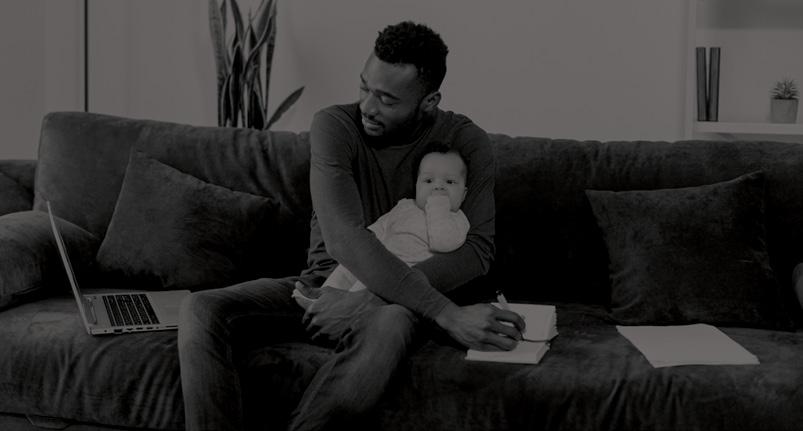

The Prevent Cancer Foundation® 2




2021 Impact Report 3
It was a pretty normal Sunday at the end of January 2016 when we noticed something a little abnormal on my left side. I will admit I was past due on scheduling my yearly OB-GYN appointment. I called the doctor on my way to work Monday morning and was scheduled to go in on Tuesday. I left the doctor feeling relieved. I had been fortunate to live a healthy life up to this point, so why would I be worried?
Come Thursday, I was lying on the table with my left arm over my head trying to guess what the radiation oncologist was looking at on the screen. She told me she wanted to do a needle biopsy. I received a call from the doctor Friday telling me I had ‘a cancer’ (yes, she actually phrased it like that).

In that instant, life as I knew it completely changed. After multiple tests over the next 2 weeks, at age 27 I was diagnosed with Stage 2b Invasive Lobular Carcinoma. I had about one year of intense treatment and am currently undergoing 5-10 years of hormone therapy.
I share this story not in an effort to scare you, but to say that cancer can happen to anyone. Fortunately, there are some simple steps to try and find it early if, heaven forbid, you are diagnosed. One of those is to stay on top of your normal health screenings. It can be easy in such hard and uncertain times to de-prioritize proactive screenings, but it’s critical that we don’t put these off. If you can take one thing away from my story, I hope you will schedule your next annual checkup or screening. Early detection really does save lives!
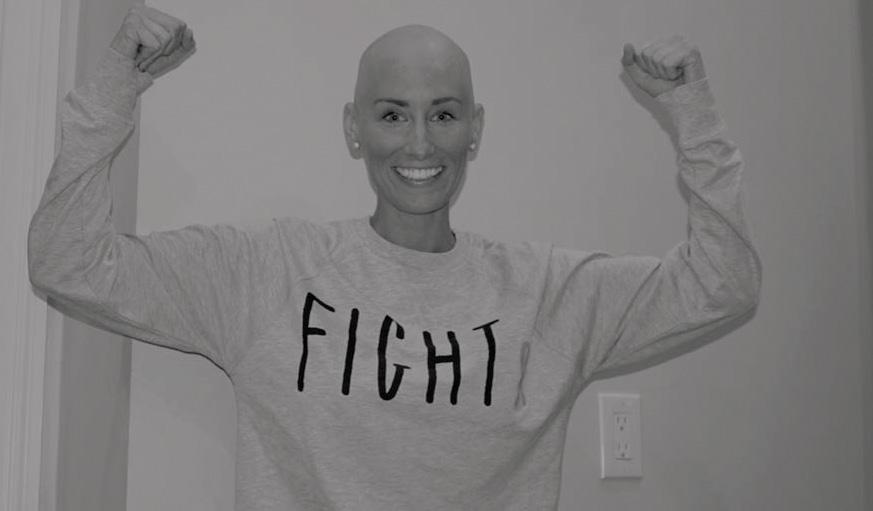
The Prevent Cancer Foundation® 4
CELEBRITY INFLUENCERS
In summer of 2020, the Prevent Cancer Foundation launched the Back on the Books campaign to encourage people to reschedule their routine cancer screenings following delays and cancellations due to the Covid-19 pandemic. In spring 2021, we partnered with two celebrity influencers to share the Back on the Books messaging with their social media followers: Ron Rivera, head coach of the Washington Football Team and a cancer survivor, and Meagan Good, award-winning actress.
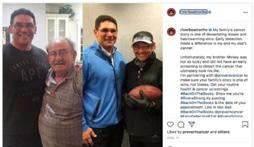
A combination of influencer outreach, advertisements and social media amplification resulted in 1.2 million impressions, nearly 10,000 clicks to the Back on the Books webpage and nearly 7,000 engagements on social media.


PHYSICIAN INFLUENCERS
A follow-up survey released in summer 2021 showed the impact of the pandemic on women’s health. For Gynecologic Awareness Month in September and Breast Cancer Awareness Month in October, we partnered with a diverse group of physician influencers to share the importance of staying up to date on cervical and breast cancer screenings.

2021 Impact Report 5
Multi-cancer early detection (MCED) tests are blood-based screening tests (also called liquid biopsies) that are designed to identify the presence of cancer for more than one cancer at a time at the earliest possible stages, before noticeable symptoms occur.
Multi-cancer early detection is a groundbreaking new type of cancer screening test that utilizes advances in genomic science and machine learning to transform cancer detection. MCED tests:
• Are designed to detect many types of cancer by looking for cancer signals in the blood.
• Are designed to be complementary to existing screenings and extend the benefits of early detection to catch more cancers in early, more treatable stages.

• Have received breakthrough designations from the Food and Drug Administration (FDA). Their clinical programs continue to advance, as evidenced by data published in peer-reviewed publications.
• Are being developed by many companies in partnership with some of the leading cancer research institutions in America.

The Prevent Cancer Foundation led more than 300 organizations from all 50 states in joining together in a sign-on letter to support the Medicare Multi-Cancer Early Detection Screening Coverage Act of 2021. Our goal is to ensure that when these tests are approved by the FDA, seniors and other Medicare beneficiaries will have access to them.
A diverse array of additional medical, community and public health-focused organizations across the U.S. join with the Prevent Cancer Foundation in applauding the legislation and calling for action on this issue. These organizations provide essential services to cancer patients, offer resources to families and raise awareness of the need to improve prevention and care for a range of different cancers.
In June 2021, the Prevent Cancer Foundation launched an education campaign and ran both print and digital public service ads to raise awareness of multi-cancer early detection testing. A print ad ran in the Washington Post and digital ads ran in The Washington Post, Politico and The Hill. Each digital ad directed individuals to the Prevent Cancer Foundation website on multi-cancer early detection testing. The ads resulted in a 12,116% increase in web traffic from the previous week.
The Prevent Cancer Foundation® 6
By expanding the benefits of early detection to more cancers and more people—especially individuals in racial and ethnic minority groups, individuals with no insurance coverage, and people with complex medical needs and others where screening rates are low and late-stage diagnoses are high—outcomes for cancer patients could also improve.

 —Jody Hoyos
—Jody Hoyos
The 2021 Prevent Cancer Advocacy Workshop convened patients, providers, advocacy organizations and other stakeholders to engage in a dialogue around emerging technology in cancer prevention and control. The event featured speakers and breakout sessions focused on patient-centered considerations for multi-cancer early detection (MCED) testing, including access, affordability, acceptance and accountability. Given the Foundation’s mission of saving lives across all populations through cancer prevention and early detection, MCED testing has been identified as a priority. Numerous specialty care and advocacy organizations were represented, including the Cancer Policy Institute at the Cancer Support Community, Johns Hopkins Medicine, the Mayo Clinic, the American Cancer Society-Cancer Action Network and Livestrong Cancer Institutes at the Dell Medical School.
Following the Advocacy Workshop, the Prevent Cancer Foundation released a white paper detailing a patient-centered approach to MCED testing. Highlights of the paper include MCED 101; presentation summaries on access, affordability, acceptance and accountability; existing Medicare coverage and legislation in the 117th Congress; and findings and common themes. You can read the white paper and learn more about the Foundation’s work on MCED testing at preventcancer.org/early.
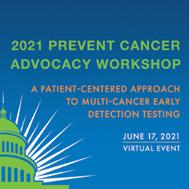
2021 Impact Report 7
With your help in 2021, the Prevent Cancer Foundation awarded nine promising research grants and fellowships with different areas of focus: cancers of the pancreas, esophagus, liver, lung, skin, prostate, colon-rectum and blood/bone marrow. Our funding helps propel early-career researchers toward larger grants that will expand their work in innovative ways to positively impact people’s lives through improved cancer prevention and early detection.
GRANTEE: Limor Appelbaum, M.D.



NAMED AWARD: Awesome Games Done Quick
INSTITUTION: Beth Israel Deaconess Medical Center, Boston, Mass.
PROJECT TITLE: Use of medical records and microbiome for predicting pancreatic cancer
GRANTEE : Julie A. Barta, M.D., A.T.S.F.

NAMED AWARD: Richard C. Devereaux Outstanding Young Investigator Award

INSTITUTION: Sidney Kimmel Medical College at Thomas Jefferson University, Philadelphia, Pa.
PROJECT TITLE: Improving lung cancer screening barriers for vulnerable populations

GRANTEE : Neil Box, Ph.D.
INSTITUTION: University of Colorado Denver, Anschutz Medical Campus and Denver Campus, Denver, Colo.
PROJECT TITLE: Integrating sun damage indicators in melanoma risk modeling
GRANTEE : Sigrid Carlsson, M.D., Ph.D., MPH

NAMED AWARD: Awesome Games Done Quick
INSTITUTION: Memorial Sloan Kettering Cancer Center, New York, N.Y.
PROJECT TITLE: Improving prostate cancer screening using innovative technology
GRANTEE : Margie Clapper, Ph.D.
INSTITUTION: The Research Institute of Fox Chase Cancer Center, Philadelphia, Pa.
PROJECT TITLE: Impact of atorvastatin with or without aspirin on colorectal biomarkers in patients with Lynch Syndrome: a pilot study
GRANTEE : William Grady, M.D.

NAMED AWARD: The Shure Family Charitable Foundation
INSTITUTION: Fred Hutchinson Cancer Research Center, Seattle, Wash.
PROJECT TITLE: Dysbiotic esophageal microbiomes and esophageal cancer risk
The Prevent Cancer Foundation® 8
FELLOW: Natalia Heredia, Ph.D., MPH

NAMED AWARD: Marcia and Frank Carlucci Charitable Foundation
Researcher update: 2019 awardee
GRANTEE: John McDonald, Ph.D.




NAMED AWARD: Michele and Drew Figdor Award
INSTITUTION: Georgia Institute of Technology, Atlanta, Ga.
PROJECT TITLE: Noninvasive test for the detection of Type I and Type II ovarian cancer
Ovarian cancer is usually diagnosed in late stages, when treatment may not be successful. Previously, Dr. McDonald’s team developed a method to distinguish between healthy women and those with early-stage ovarian cancer. With funding from the Prevent Cancer Foundation, Dr. McDonald and his research team conducted a pilot study to see if this non-invasive method can also distinguish highly-aggressive ovarian cancer from less-aggressive cancer.
Dr. McDonald’s research project was completed in August 2021—and indeed found that certain metabolites in the blood of ovarian cancer patients appear to accurately distinguish between Type I and Type II ovarian cancers. Additional machine-learning based analyses are underway to identify the minimum number of specific metabolites that most accurately distinguish between ovarian cancer types.
Dr. McDonald will use these preliminary results for a larger proposal to the National Institutes of Health (NIH) to expand the number of patients in the study and go into greater depth on the molecular processes and how they impact the clinical aggressiveness of ovarian cancers. These findings may contribute to more precise diagnosis of early-stage ovarian cancers and novel approaches for treatment. Thank you to all Prevent Cancer Foundation supporters for making Dr. McDonald’s research possible.
Awarded in partnership with the Union for International Cancer Control
Roya Dolatkhah, M.D.
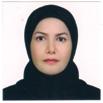
Tabriz University of Medical Sciences, Iran
TITLE OF FELLOWSHIP: Accuracy of stoolbased tests compared with colonoscopy for diagnosing colorectal cancer and advanced adenomas in northwest Iran
HOST INSTITUTION: National Cancer Institute, Division of Cancer Epidemiology and Genetics, Rockville, Maryland
Nepomuscene Ndihokubwayo, M.D.

Kamenge University Hospital Center, Bujumbura, Burundi
OF FELLOWSHIP: La cytologie en milieu liquide pour le dépistage précoce du cancer du col utérin/Liquid cytology for early detection of cervical cancer
INSTITUTION: Centre Hospitalier Universitaire de Cocody, Abidjan, Côte d’Ivoire
Bridget Lumbwe, M.Sc.
UNC Global Projects Zambia, Lusaka, Zambia
TITLE OF FELLOWSHIP: Identifying barriers that prevent women with positive CIN2/3
LEEP margins from returning for a repeat loop electrosurgical excision procedure (LEEP), and identifying strategies to address this low adherence to treatments
HOST INSTITUTION: International Agency for Research on Cancer, Lyon, France
Nicaise Ntahondi Kamenge, M.D. University Hospital Center, Bujumbura, Burundi


TITLE OF FELLOWSHIP: Renforcement des capacités en technique et diagnostics immunohistochimiques des cancers/Capacity building in techniques and immunohistochemical cancer diagnostics

HOST INSTITUTION: Hôpital Général de Grand Yoff, Dakar, Sénégal
Manikanda Nesan Sakthivel, M.D. Indian Council of Medical Research (ICMR), National Institute of Epidemiology, Chennai, India

TITLE OF FELLOWSHIP: Designing a prepost intervention trial to assess the impact of community health worker-led counseling and navigation on the uptake of colposcopy among non-compliant women screened positive in a community-based screening program
HOST INSTITUTION: International Agency for Research on Cancer, Lyon, France
Tamar Skhirtladze, M.D., MSPH, MPA National Screening Center, Tbilisi, Georgia

TITLE OF FELLOWSHIP: Enhancing Screening Services for Early Detection of Cervical Cancer in Georgia
HOST INSTITUTION: International Agency for Research on Cancer, Lyon, France

The Prevent Cancer Foundation® 10
With funds raised from the Awesome Games Done Quick weeklong videogaming marathon, $375,000 was awarded in support of highimpact global grants to combat cervical cancer in low-resource areas in Kenya, El Salvador, Nepal and India. The five new projects are aligned with the World Health Organization’s (WHO) call for the elimination of cervical cancer by 2030.
We are proud to support these one-year, $75,000 cervical cancer prevention and early detection grants through our global grants program, which focuses on assessing innovative technologies and delivering services and/or education to improve or expand quality cancer screening or prevention.
ORGANIZATION: Grounds for Health
TITLE: Successful Implementation of HPV Self-Sampling in Rural Kenya
LOCATION: Kenya
Human papillomavirus (HPV) DNA testing is endorsed by the WHO as a preferred screening method to end cervical cancer worldwide. This project will allow Grounds for Health to expand its HPV self-sampling initiative, a widely accepted HPV testing method, as part of their efforts to identify best practices in service delivery in low-resource settings.
ORGANIZATION: Basic Health International
TITLE: Feasibility of Thermal Ablation for Cervical Precancer Treatment

LOCATION: El Salvador
Cervical cancer screening must be linked to effective and timely treatment of precancerous lesions for the best possible outcomes. This project will evaluate thermal ablation, a new portable treatment that could increase access to care for women in remote and hard-to-reach areas.
ORGANIZATION: Basic Health International
TITLE: Shifting PCR Testing Capacity from COVID-19 to Cervical Cancer Prevention
LOCATION: El Salvador
This project investigates the feasibility of a new low-cost, self-collected, rapid HPV screening test that is processed in the same polymerase chain reaction (PCR) machines that were acquired for COVID-19 testing. Same-day screening results in combination with portable cervical precancer treatment have the potential to greatly increase access to cervical cancer prevention for medically-underserved populations.
ORGANIZATION:
Cancer Care Nepal
TITLE: A Cervical Cancer Prevention Training Program for Nepal LOCATION: Nepal
Cervical cancer is the most common cancer among women in Nepal. This project will implement a new program to train nurses and doctors on the necessary screening tests to identify precancerous cervical lesions and treatment procedures to prevent progression to cancer.
ORGANIZATION: Christian Medical College, Vellore, Tamil Nadu
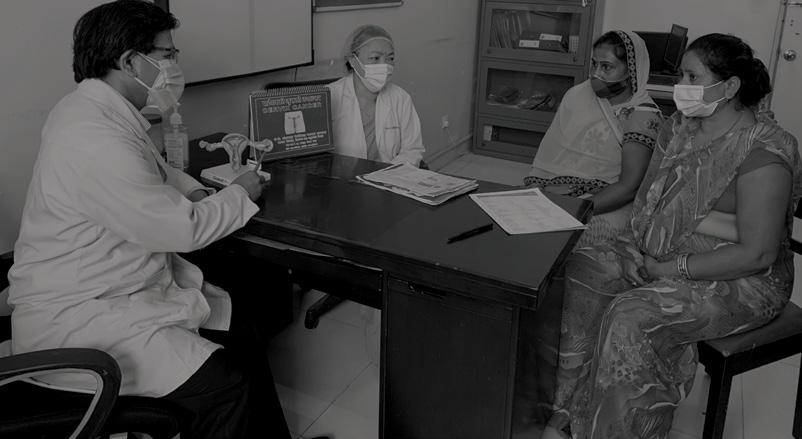
TITLE: Preventing Cervical Cancer Through Low-Cost HPV Testing Approaches in Low-Resource Settings of India
LOCATION: India
Access to cervical cancer screening in India is not widespread. This project will work with community partners to assess the feasibility of using low-cost HPV self-testing as a screening method in three diverse settings (rural poor, urban slums and tribal villages).
2021 Impact Report 11
—Dr. Rita Isaac, MBBS, MD, MPH, Professor
The outputs of our research will contribute to the wider knowledge base informing policy decisions in India on how best to provide national scale up of cervical cancer services for women in poverty.
To advance our bold goal of reducing cancer deaths by 40% by 2035, the Foundation provided $250,000 this year in support of 10 projects dedicated to increasing cancer prevention and early detection in medically underserved communities across the U.S. The projects were selected through a highly competitive grants process, and each program received a one-year, $25,000 grant.
Some projects are offering screening for the first time, while others are focused on getting people’s screenings “back on the books,” because of so many postponed or cancelled appointments due to the pandemic. These projects will have a direct and positive impact on communities across the U.S., from Cheyenne, Wyoming, to Bangor, Maine.
Eastern Maine Medical Center (EMMC) • Bangor, Maine
In partnership with the Bangor Region YMCA Caring Connections program, which supports free mammograms for qualifying patients, EMMC will implement process improvements to increase access to screening for patients who have missed or cancelled mammograms due to COVID-19. The project will focus on vulnerable rural and LGBTQ+ communities.
Equal Hope • Chicago, Ill.
The Returning to Normal—a Catch-up Cancer Screening Program will expand Equal Hope’s current breast and cervical cancer program, urging 60,000 people to schedule cancer screenings that may have been cancelled or postponed due to COVID-19, and navigating 1,000 medically underserved women directly to screening.
Erie Family Health Center, Inc.
• Chicago,
Ill.

The Breast Cancer Continuum of Care Program at Erie Family Health Centers aims to address the language, cultural, financial and logistical barriers Latinas may face when accessing screening on Chicago’s West Side. The project will deliver robust outreach and education and refer more than 2,000 women for mammograms.
Long Island Jewish Medical Center • New Hyde Park, N.Y.
The Cancer Community Connection Program will increase access to breast, cervical and colorectal cancer screening for 2,000 medically underserved individuals in New York. The program will also provide 200 people with comprehensive patient navigation that will identify and eliminate logistical, financial, linguistic, psychosocial and other barriers that can challenge access to enhanced screening services.
Syracuse University • Syracuse, N.Y.
Empowering Black Pastors to Amplify Colorectal Cancer Prevention Messages to Underserved Communities is a culturally sensitive, faith-based health education intervention. This project will reach 5,000 high-risk African Americans with colorectal cancer education on risk factors and the importance of prevention and early detection.
The Hmong Institute, Inc. c/o Milwaukee Consortium for Hmong Health
• Milwaukee, Wis.
The Milwaukee Consortium for Hmong Health (MCHH) will provide outreach and education to increase screening rates in medically underserved Southeast Asian refugee communities in Milwaukee. The Saving Lives Through Cancer Education During the Pandemic project will reach 400 men and women through strong community partnerships.

The Prevent Cancer Foundation® 12
Vietnamese American Cancer Foundation (VACF) • Fountain Valley, Calif.
In the Vietnamese American community, cancer is a leading cause of death. VACF’s Cancer Education and Patient Navigation Program will provide 600 Vietnamese Americans with cancer prevention education and will navigate 250 community members to health care, including cancer screenings.
West Virginia University (WVU) • Morgantown, W.Va.
The WVU Cancer Institute’s Mobile Lung Cancer Screening Unit (LUCAS) will partner with approximately 150 community clinics around West Virginia to provide lung cancer screening to 600 patients. Through the use of the mobile unit, the LUCAS Program will remove financial and structural barriers to screening that exist in rural West Virginia.
Western Carolina Medical Society Foundation
• Asheville, N.C.
The Western North Carolina Colorectal Cancer Screening Initiative is the only program in its region providing colorectal cancer screening to uninsured individuals. This project will provide stool-based fecal immunochemical test (FIT) screening kits to test for colorectal cancer in 500 uninsured patients.
Wyoming Breast Cancer Initiative Foundation
• Cheyenne, Wyo.
This project will allow Wyoming women to receive a mammogram without undue financial burden while still using health care providers in their local community. Through strategically developed partnerships, the Wyoming Breast Cancer Initiative will provide 40 mammograms to medically underserved women in rural areas.
2020 grantee update

ORGANIZATION: VAX 2 STOP CANCER

PROJECT TITLE: Preventing HPV-associated cancers through effective provider education
OUTCOMES:
• VAX 2 STOP CANCER trained 35 health care workers from 11 different pediatric and family practices in a five-county area in central Alabama.
• The project resulted in an average increase of 12% for human papillomavirus (HPV) vaccination rates among those practices.
• Among the trained health care providers, 83% reported an increase in knowledge and self-efficacy for providing a strong and effective recommendation for the HPV vaccine.
In 2020, nearly 2,000 individuals were educated on cancer prevention and nearly 1,000 individuals were screened for cancer.
This grant could not have been more timely, not only because of Alabama’s high HPVassociated cancer rates but also because of the 1 million doses of the HPV vaccine in the U.S. that have been missed by adolescents with insurance because of COVID.
— Barbara Schuler, VAX 2 STOP CANCER, Executive Director (2020 grantee)
The campaign focuses on reaching at-risk populations through a variety of tactics, including celebrity spokespeople, health fairs, digital advertising, advocacy efforts and trusted community and culturally sensitive partnerships to meet people where they are most comfortable.
This year, we partnered with the National Harm Reduction Coalition to reduce hepatitis C diagnoses related to the opioid crisis. We are awarding 20 micro-grants to help harm reduction sites begin or scale up syringe service programs and hepatitis C testing, with the goal of reducing risk and increasing diagnoses of hepatitis C—to ultimately prevent liver cancer. These 2020 grants include harm reduction sites in Georgia, Mississippi, Oklahoma, Pennsylvania, Texas and Wisconsin.

Together with these new harm reduction sites we will be creating new education materials on the importance of hepatitis C testing and the link between untreated hepatitis C and liver cancer.
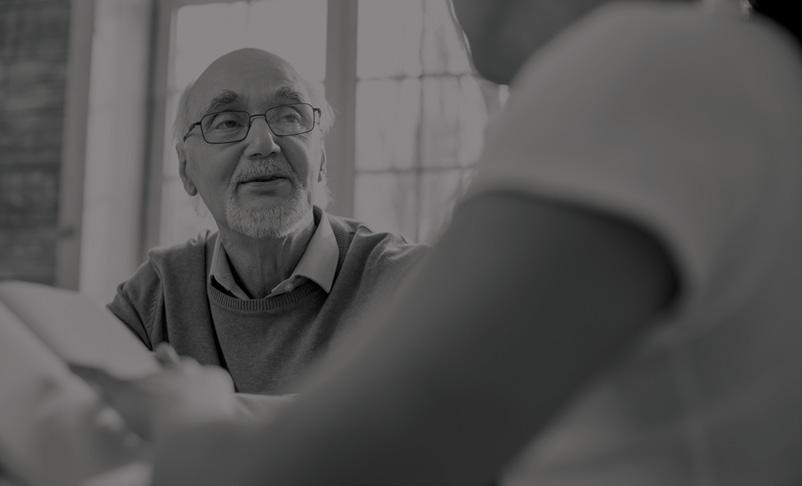

The Prevent Cancer Foundation® 14
• Nearly 3 million impressions

• 22,000 direct clicks to the Too Young for This Sh*t educational web page


The Prevent Cancer Foundation was also an instrumental voice in the efforts to lower the colorectal cancer screening age from 50 to 45.
At the end of 2020, 20 members of Congress joined with Reps. Jamie Raskin (D-Md.) and Rodney Davis (R-Ill.) in a letter to the Department of Health and Human Services in support of the U.S. Preventive Services Task Force (USPSTF) lowering the recommended screening age for colorectal cancer to age 45. Reps. Raskin and Davis used the Foundation’s Gut Check report to emphasize the problem of youngonset colorectal cancer and applaud the new draft guidelines from the USPSTF to begin screening at age 45. These guidelines were finalized in spring of 2021, a move that was celebrated by the Foundation and cancer prevention and early detection advocates everywhere.
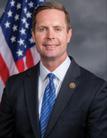
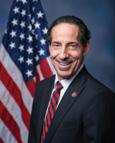

15
Rep. Jamie Raskin Rep. Rodney Davis
Since 1993, the Congressional Families Cancer Prevention Program’s Action for Cancer Awareness Awards luncheon has honored congressional spouses, journalists and other advocates for using their respective platforms to educate the public on cancer prevention and early detection. On September 24, 2020, the Congressional Families Program held a virtual awards ceremony streamed live on Facebook and YouTube. Congressional Families Executive Director Lisa McGovern was proud to enable the presentation of the following awards:
CONGRESSIONAL FAMILIES LEADERSHIP AWARD:
Terry Loebsack, spouse to then-Rep. Dave Loebsack (D-Iowa). Ms. Loebsack, a three-time skin cancer survivor, is a longtime member of the Congressional Families Program and its Advisory Committee.

EXCELLENCE IN CANCER AWARENESS AWARD:
Dr. Ken Jeong, actor/producer/comedian and former practicing physician. Jeong has used his comedy to raise awareness about breast cancer screening following his wife’s diagnosis. (She has now been cancer-free for 12 years.)

DISTINGUISHED SERVICE IN JOURNALISM AWARD:
Craig Melvin, “TODAY” Show co-host. Following his brother’s colorectal cancer diagnosis, Melvin began to use his platform to raise awareness about the rise of young-onset colorectal cancer, encourage family conversations and highlight the importance of screening.

SPECIAL RECOGNITION AWARD:


Games Done Quick (GDQ), an organization using a novel platform—video games—to raise significant funds for its charitable beneficiaries. GDQ hosts video game marathons and has raised more than $25 million primarily for two organizations, the Prevent Cancer Foundation and Doctors Without Borders. Through its support of the Foundation, it has brought the message of cancer prevention to a younger, global audience.

The virtual program featured welcome remarks and words of support for the honorees from House Speaker Nancy Pelosi and Republican Leader Kevin McCarthy.
The Congressional Families Cancer Prevention Program works year-round to equip members and spouses—through educational seminars and webinars, events, and op-eds and social media posts—to bring the message of cancer prevention and early detection back to their communities and constituents. 2021 events included webinars on skin cancer prevention and early detection and breast cancer screening guidelines and disparities.
The Prevent Cancer Foundation® 16
In January, hundreds of thousands of gamers from around the world (yes, hundreds of thousands!) gathered online to participate in Awesome Games Done Quick (AGDQ) 2021 and raise money for the Prevent Cancer Foundation. The annual weeklong, 24-hour-a-day event is a speedrunning marathon, featuring gamers who compete to complete video games as fast as possible. Fans show their support during the livestream by making donations and sharing how cancer has impacted their lives. Despite being completely virtual this year, the event raised more than $2.76 million from about 42,000 individual donations.

These funds will support national and global grants for cancer prevention and early detection. Throughout the event, several Prevent Cancer Foundation grant recipients spoke with gamers about their global work made possible by past AGDQ marathons. Games Done Quick has grown from a $10,000 fundraiser—held in a basement in 2010—to a twice-annual event that typically draws thousands of in-person participants and hundreds of thousands more online to raise millions for selected charities.
With support from passionate gamers, we are well on our way to a world where no one dies of cancer.
During the marathon, the Prevent Cancer Foundation invited participants to share #WhyIAGDQ on social media.

Cancer took my grandparents, but couldn’t take my mom. Seeing others who love games as much as I do harness that passion to improve the world is an amazing sight and gives me hope that we’ll be able to save so many more from cancer. — @GamingBricaBrac, submitted on Twitter
Prevention. Action. Screening Prevent Cancer Dialogue:

This award is an encouragement to keep serving the African immigrant community in the best ways that we can.
The 2021 Dialogue had more than 1,200 individuals registered from:
• 49 states
• several American Indian/Alaska Native groups
• District of Columbia
• Guam
• Puerto Rico
Thank you for providing perspective on different populations. The facts and figures and findings presented were very eye-opening.
– 2021 Virtual Dialogue Attendee

2021 Cancer Prevention Laurels Awards:

• 18 other countries in Latin America and the Caribbean, SubSaharan Africa, East Asia, South Asia and Europe.
The 2021 awards were presented virtually to recognize extraordinary work in cancer prevention or early detection, especially in times of COVID-19:
• Cancer Prevention Laurel for National Leadership: David Ahlquist, M.D., Mayo Clinic (posthumous award)
• Cancer Prevention Laurel for Dedication to Community Service: Ify Anne Nwabukwu, African Women’s Cancer Awareness Association
• Cancer Prevention Laurel for Increasing Health Equity through Innovation: Tsu-Yin Wu, Ph.D., MSN, Eastern Michigan University
— Ify Anne Nwabukwu
Quantitative Imaging Workshop XVIII:
Optimizing Thoracic Imaging to Detect and Manage Early Lung Cancer/COPD
The 18th Quantitative Imaging Workshop, held virtually November 4-5, 2021, explored the intersection of quality thoracic imaging and the possible early detection and subsequent clinical intervention of early lung cancer/COPD. In partnership with the American Lung Association, the Foundation brought together thought leaders from across disciplines involved in the global implementation of thoracic CT screening to exchange ideas on exciting new biomedical opportunities that this transformational technology enables, as well as information on the quality, equity and consistency of policy and advocacy for responsible lung cancer, COPD and cardiovascular screening.
Key Issues

Attendees discussed ways to increase the benefit of thoracic CT imaging of individuals with a history of extended tobacco product use—from population health strategies to the inherent challenges in obtaining equitable, quality data. Participants also explored how pre-symptomatic detection of major chronic conditions by low-dose computed tomography (LDCT) may allow more robust support of preventive practices and result in impactful clinical interventions.
James L. Mulshine, M.D., National Leadership Award
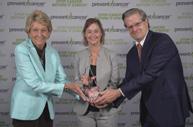
Mary Pasquinelli, DNP, APRN, FNP-BC, received this award in recognition of her leadership of the lung cancer screening program at University of Illinois Hospital’s federally qualified health center on Chicago’s West Side. The award underscored her dedication to delivering screening services to vulnerable populations around the world, while continuing research to enable greater benefit from screening.
Results
Stay tuned for two combined COPD and lung cancer screening protocol guidance documents – one focusing on possible clinical interventions and one on quality image acquisition for COPD and lung cancer.
In 2020, the usual inperson format of the Quantitative Imaging Workshop was replaced by a virtual meeting, held in partnership with the American Lung Association on October 28-30. This allowed for safe global participation of thought leaders. Attendees explored clinical practice recommendations and collaborated with the American Cancer Society National Lung Cancer Roundtable and the Quantitative Imaging Biomarker Alliance of the Radiological Society of North America to discuss how to optimize the precision of image quantitation.

Though our 2020 Virtual Gala was one for the record books, the Prevent Cancer Foundation was thrilled to welcome guests back in person at the National Building Museum on December 1, 2021, for the Prevent Cancer Annual Gala.
HONORED
The 2021 Gala honored His Excellency, the Ambassador of the Republic of Korea, Soo Hyuck Lee and Mrs. Hye Kyung Hwang

PERFORMED
• Rayshun LaMarr, cancer survivor, season 4 semi-finalist, The Voice

• Ali Rogin, cancer “previvor,” producer, PBS
• Sister Hazel, rock band
• Washington Samulnori, traditional Korean percussion group

The Prevent Cancer Foundation® 20
INSPIRED
Actor, singer and song writer Rayshun LaMarr shared his moving story during the Lighting the Way to Prevention pledge drive. In 2012, he was diagnosed with lymphoma, and battled through two years of extreme medication and chemotherapy. The battle against cancer affected his hearing and voice to the point of temporary loss. Fortunately, Rayshun beat his cancer and regained his beautiful voice—and shared his talents with us at the Gala.
AWARDED
The Foundation recognized Senator Tim Scott and Representative Debbie Dingell with the 2021 Cancer Champion awards.


DESIGNED



SUPPORTED
Our sincerest thanks to Gala Co-chairs Nickie Currie, Ted Okon and Susanna Quinn and Dinner Committee Co-chairs Kathryn Kennedy and Lori Reilly for their hard work to make this event possible.
RAISED
The Prevent Cancer Annual Gala shattered the initial $1.6 million goal. At press time, the event had raised $1.8 million and counting.
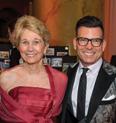
The stunning décor, a tribute to the Republic of Korea, was designed by board member and weddings and celebrations expert David Tutera. This year marked David’s 20th Anniversary of designing a breathtakingly beautiful event for the Foundation.

Jeremy Hardy FitzGerald

“My father died of cancer when I was 10 years old, so I have always been sympathetic of Bo’s [Carolyn Aldigé’s] founding of the Foundation [in memory of her father]. I happened to pick up the phone the night the doctor called to say my father had died. This was 1950. I remember him saying so clearly, ‘I wish there were more we could have done.’ And I think each step the Foundation takes, through education, research and community outreach, is helping do more.
As a cancer survivor myself and a member of the board of directors, it’s been one of the things I feel has been most important to me in my life. The Foundation has given me so much more than I have been able to give the Foundation, and I’m so grateful for the experience.
The most encouraging fact is that we hope to reduce cancer deaths by 40% by 2035, and stop cancer before it starts. Read the mission of the Foundation—it’s everything we should be doing to help prevent this disease, to have early detection, and to help those with the disease.”
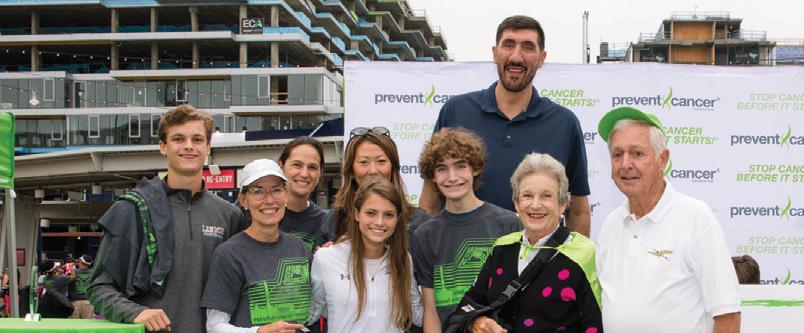
The Prevent Cancer Foundation® 22
Ravi “feardragon” Pareek
“I heard about the Prevent Cancer Foundation through Awesome Games Done Quick (AGDQ), and when I decided to raise money to combat cancer, it was the first organization I thought of.


The community that participated in our fundraiser is the esports community for a game called StarCraft 2. We’ve had members of our community who have battled or are still battling cancer. One of the most notable was the loss of our dear friend, John “TotalBiscuit” Bain.
I think this cause is very near and dear to a lot of us. Cancer treatment is an important area, but even better to me is early detection and prevention before it can take root to minimize the disruption and suffering.
I decided to put together the fundraiser for my 10-year anniversary of getting started in this space. [The work of the Prevent Cancer Foundation] really does mean the world to me and the rest of the StarCraft 2 community.”
2021 Impact Report 23
“June 19th is my least favorite day of the year. This year, June 19, 2020, marks five years since my mom passed. [In] previous years, I spiral into being an anxious and depressed mess, stuck in a loop reliving the day she died. This year has been different. This year I’m doing something positive with my grief…I’ve put together a charity compilation on my label of cover songs that benefit the Prevent Cancer Foundation, Songs for Moms vol. 1.”


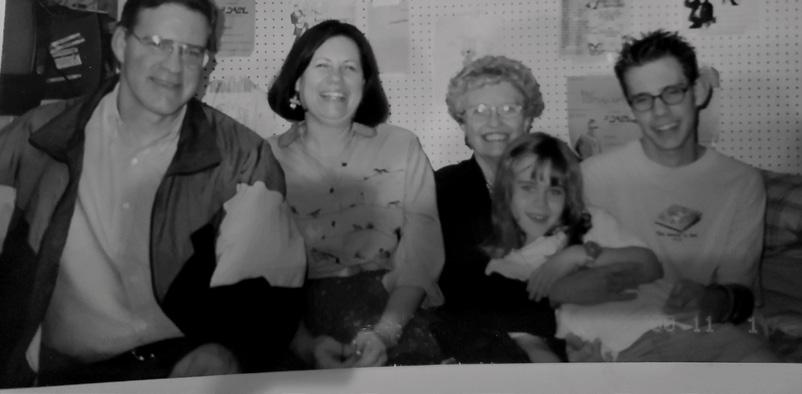
Chris’ story is one we hear all too often. For those impacted by cancer, whether it is your own diagnosis or that of a loved one, the date of diagnosis or loss can feel hard to face. Taking back your day with a new positive memory can be a great way to channel those difficult feelings and associations. Putting together a fundraiser to benefit the Prevent Cancer Foundation is a meaningful way to commemorate that date and turn one of your hardest days into a way to help others so they never have to go through what you did.
“I hope this can be the start of something big and I’m already looking forward to Volume 2 next year!” Chris said.
If you are ready to host your own fundraiser, you can get started in just two easy steps:

1. Go to www.youcanpreventcancer.org to create your personal fundraising page.


2. Share that page with family and friends!
Fundraisers like Chris’ charity compilation are critical to helping the Foundation continue its work to Stop Cancer Before It Starts!® Thank you for “taking back the day” with the Prevent Cancer Foundation.
The Prevent Cancer Foundation® 24


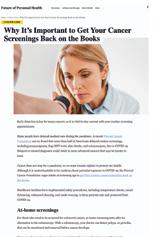
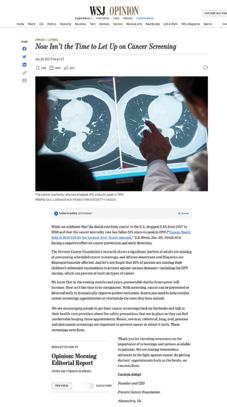
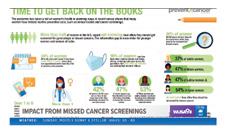
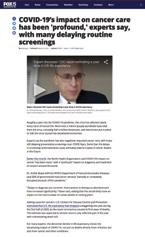
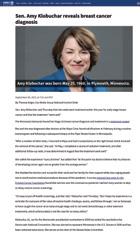

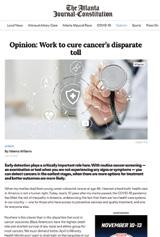
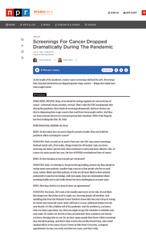
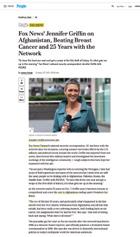
2021 Impact Report 25
BreastEducationHealthGuide for every generation




It seems like everyone and their mother is on social media—but perhaps not the same social media.
The Foundation has long had a presence on Facebook, Twitter, LinkedIn and Instagram, but as the social landscape changes, we recognize a need to evolve and reach a broader audience through more platforms.

Now, you can also find us on TikTok and Discord—so wherever you are hanging out online, you can follow the Foundation and engage with us as we share the latest news in cancer prevention and early detection, updates on how your donation dollars are being spent and stories that remind us why we are working toward a world where no one dies of cancer.





Since its launch in 2008, the Breast Health Education for Young Women Facilitator’s Guide has been downloaded or shared in 61 countries, as well as in all 50 states, 5 U.S. territories, and the District of Columbia.


Both the English- and Spanish-language guides were updated in 2021 and are designed for interactive group sessions on breast health and breast cancer.
In the last six months, 75 people from the U.S., Ghana, Greece, India, Nigeria, Qatar and South Africa downloaded the facilitator’s guide. Out of the surveyed group (N=66), 67% intended to use it to educate a group or a community on breast health, 50% were planning to share with colleagues, 32% wanted to use it as a reference for themselves and 30% wanted to share it with friends and family.

us and join the conversation!
Follow
The preventGEN committee provides the perspective of younger generations on cancer prevention and early detection. Committee members collaborate with Foundation staff on ideas for campaigns, programs, concepts and content. Their feedback is instrumental in helping the Foundation extend its mission of saving lives across all populations through cancer prevention and early detection.
Elisabeth Clymer Hockersmith




Texas
Valeria Copello
Florida
Suzanne Hafiz


Illinois
Sonya Jampel
District of Columbia
Monica Kasting


Indiana
Joan Malcolm

California
Gabriela Morales
New Mexico
Mary Nicholas
Washington
Elisa Salazar
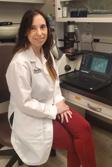
Illinois
Megan Sappenfield
Texas
Jane Smith
Utah
Erin Steigleder




Virginia

Alicia Storkamp
Minnesota

Kelly Thomas
Connecticut
Irina Usherenko
Washington
Vanessa Uzoh
Texas

2021 Impact Report 27
Jeremy FitzGerald Secretary

Paul Phaneuf Treasurer






















The Prevent Cancer Foundation® 28
Carolyn R. Aldigé Founder and CEO
Gary Lytle Chairman
Joann Piccolo Vice-Chairman
James L. Mulshine, M.D. Vice-Chairman, Scientific Director
Diane Casey-Landry
The Hon. Victor Fazio
Jennifer Griffin
Whitfield Growdon, M.D., FACS
Charles Houser
Joel Jankowsky
Mia Spiker Johnson
Shabnam Kazmi
William Magner
Brandon Parry
Susanna Quinn
Hollyn Kidd Schuemann
Brian Shure
Pawan Singh
Jason Van Pelt
Senior Staff
Founding Directors
Alan P. Dye
Hon. Harold Keshishian*
Emeritus Directors
David S. Alberts, M.D.
Catherine P. Bennett
Margaret Bush

Marcia Myers Carlucci

Elmer E. Huerta, M.D., MPH
Alexine C. Jackson
Brock R. Landry
Sustaining Directors
Betty Alewine
Joyce H. Gates
Lilibet Hagel


Gordon (Don) Hutchins
Marcelle Leahy

Lynne O’Brien
Jean Perin
Andrea Roane
George Swygert
David Tutera
Margaret Vanderhye
Virginia A. Weil

*Deceased
Carolyn R. Aldigé
Founder and Chief Executive Officer
Jody Hoyos President and Chief Operating Officer
Jennifer Niyangoda
Vice President of Development and Marketing
Karen Peterson, Ph.D. Vice President, Programs
Lisa Berry Edwards
Managing Director, External Affairs

Amy Sokal Managing Director, Finance and Administration


Lisa McGovern Executive Director, Congressional Families Cancer Prevention Program

Medical Advisory Board
David (Dave) S. Alberts, M.D.
Director Emeritus, University of Arizona Cancer Center
Retired Regents Professor of Medicine, Pharmacology, Nutritional Sciences, Public Health and BIO5
The University of Arizona College of Medicine
Jasjit S. Ahluwalia, M.D., M.P.H, M.S. Professor Brown University School of Public Health
Bart Barlogie, M.D., Ph.D. Professor of Medicine, Hematology and Medical Oncology, Retired Ichan School of Medicine Mount Sinai
Monica M. Bertagnolli, M.D., FACS, FASCO
Group Chair, Alliance for Clinical Trials in Oncology
Professor of Surgery, Harvard Medical School
Associate Surgeon, Brigham and Women’s Hospital and Dana-Farber Cancer Institute
Rachel F. Brem, M.D., F.A.C.R., F.S.B.I. Professor and Vice-Chair Director, Breast Imaging and Interventional Center
Program Leader Breast Cancer, the GW Cancer Center
Founder and Chief Medical Advisor, The Brem Foundation
Department of Radiology
The George Washington Cancer Center George Washington University
Paul A. Bunn Jr., M.D.
Professor, James Dudley Chair in Cancer Research
University of Colorado Denver School of Medicine
Division of Medical Oncology

Sigrid Carlsson, M.D., Ph.D., MPH. Assistant Attending Epidemiologist Memorial Sloan Kettering Cancer Center
Kenneth H. Cowan, M.D., Ph.D. Director, Fred and Pamela Buffett Cancer Center
University of Nebraska Medical Center
Riccardo Dalla-Favera, M.D.
Director, Institute for Cancer Genetics
Irving Cancer Research Center Columbia University Medical Center
William S. Dalton, M.D., Ph.D. Founder & Executive Chair, M2Gen
Andrew Dannenberg, M.D.
Henry R. Erle, M.D. – Roberts Family Professor of Medicine
Associate Director of Cancer Prevention, The Sandra and Edward Meyer Cancer Center Weill Cornell Medicine
Raymond N. DuBois, M.D. Ph.D. Dean, College of Medicine Medical University of South Carolina
H. Shelton (Shelley) Earp III, M.D. Director, Lineberger Comprehensive Cancer Center University of North Carolina
Stephen B. Edge, M.D., FACS, FASCO Vice President, Healthcare Outcomes and Policy Roswell Park Cancer Institute
Margaret Foti, Ph.D., M.D., (h.c.) Chief Executive Officer American Association for Cancer Research (AACR)
Harold P. Freeman, M.D.
Chairman Emeritus and Founder Ralph Lauren Center for Cancer Care and Prevention
Patricia A. Ganz, M.D.
Distinguished Professor Health Policy & Management and Medicine UCLA Fielding School of Public Health
David Geffen School of Medicine at UCLA Director, Cancer Prevention & Control Research
Jonsson Comprehensive Cancer Center
David M. Gershenson, M.D. Professor, Department of Gynecologic Oncology & Reproductive Medicine
The University of Texas MD Anderson Cancer Center
Edward Giovannucci, M.D., Sc.D. Professor of Nutrition and Epidemiology
Harvard T.H. Chan School of Public Health
Anna R. Giuliano, Ph.D. Professor and Director of the Center for Immunization and Infection Research in Cancer
H. Lee Moffitt Cancer Center and Research Institute
Gary E. Goodman, M.D., M.S. Staff Oncologist/Joint Member Swedish Cancer Institute
Fred Hutchinson Cancer Research Center
Garth Graham, M.D., MPH Director and Global Head, Healthcare and Public Health, Google Head, YouTube Health
Stanley R. Hamilton, M.D. Professor and Head, Division of Pathology and Laboratory Medicine
The University of Texas MD Anderson Cancer Center
Claudia Henschke, Ph.D., M.D. Professor of Radiology
Department of Radiology
Icahn School of Medicine at Mount Sinai
Elmer E. Huerta, M.D., MPH Director, Cancer Preventorium GW Cancer Center Clinical Professor of Medicine GW School of Medicine
Derek M. Huffman, Ph.D. Associate Professor of Molecular Pharmacology and Medicine Institute for Aging Research Co-Director: CEAC Core Albert Einstein College of Medicine
Lovell A. Jones, Ph.D., F.H.D.R Adjunct Professor, Department of Health Promotion & Community Health Sciences, Texas A&M University School of Public Health (TAMSPH), College Station, Texas; Research Faculty, College of Science & Engineering, Texas A&M University Corpus Christi; Professor Emeritus, University of Texas Distinguished Teaching Professor, University of Texas MD Anderson Cancer Center; Professor Emeritus, University of Texas Graduate School of Biomedical Sciences
Karen E. Kim, M.D., M.S. Office of Community Engagement and Cancer Disparities
University of Chicago
T. Peter Kingham, M.D., FACS
Associate Attending Surgeon Hepatopancreatobiliary Service
Department of Surgery
Director, Global Cancer Disparity Initiatives Memorial Sloan Kettering Cancer Center
Ann G. Kulze, M.D. Dr. Ann & Just Wellness, LLC
Charles (“Chip”) Landen, Jr., M.D., M.S.
Associate Professor
University of Virginia Health System
University of Virginia
Bernard Levin, M.D.
Professor Emeritus
The University of Texas

MD Anderson Cancer Center
Marc E. Lippman, M.D.
Professor of Oncology and Medicine
Georgetown Lombardi Comprehensive Cancer Center
Scott M. Lippman, M.D.
Distinguished Professor of Medicine
Senior Associate Dean and Associate Vice Chancellor for Cancer Research and Care
Chugai Pharmaceutical Chair in Cancer University of California, San Diego
Patrick J. Loehrer, Sr., M.D.
Director, Indiana University
Melvin and Bren Simon Cancer Center Indiana University
John L. Marshall, M.D.
Professor of Medicine
Chief, Division of Hematology and Oncology
MedStar Georgetown University Hospital
Director, Ruesch Center for the Cure of GI Cancers
Professor of Medicine and Oncology
Lombardi Comprehensive Cancer Center
Elena Martinez, MPH, Ph.D.
Professor of Family and Preventive Medicine
Moores Cancer Center
University of California, San Diego
Harold L. Moses, M.D.
Director Emeritus
Vanderbilt-Ingram Comprehensive Cancer Center
Larry Norton, M.D.
Senior Vice President, Office of the President Medical Director, Evelyn H. Lauder Breast Center
Norna S. Sarofim Chair of Clinical Oncology
Department of Medicine
Memorial Sloan Kettering Cancer Center
Gilbert S. Omenn, M.D., Ph.D.
Harold T. Shapiro Distinguished University Professor
Senior Director, Center for Computational Medicine & Bioinformatics
Professor of Computational Medicine & Bioinformatics, Internal Medicine, Human Genetics and Public Health
University of Michigan
The Prevent Cancer Foundation® 30
Darrell S. Rigel, M.D., M.S. Clinical Professor of Dermatology
John C. Ruckdeschel, M.D. Ruckdeschel Consulting Adjunct Professor, University of Mississippi
Kathleen Schmeler, M.D. Professor, Department of Gynecologic Oncology and Reproductive Medicine; Executive Director, Global Oncology, MD Anderson Network; Director, MD Anderson Cancer Center and Lyndon B. Johnson Hospital Colposcopy Clinics
David Schottenfeld, M.D., M.Sc. John G. Searle Professor Emeritus of Epidemiology and Internal Medicine University of Michigan School of Public Health
Department of Epidemiology
Karen Sfanos, M.S., Ph.D. Associate Professor of Pathology Johns Hopkins University School of Medicine
Erich M. Sturgis, M.D., MPH, FACS Professor and Vice-Chair of Clinical Affairs Brown Foundation Endowed Chair Director, Neck and Thyroid Cancer Multidisciplinary Program Baylor College of Medicine
George J. Weiner, M.D. Director, Holden Comprehensive Cancer Center
University of Iowa
Richard C. Wender, M.D.
Chair of the Department of Family Medicine and Community Health University of Pennsylvania Perelman School of Medicine
Petra Wilder-Smith, D.D.S., Ph.D. Director of Dental Programs Beckman Laser Institute and Medical Clinic University of California Irvine
Walter C. Willett, M.D., Dr.P.H. Professor of Epidemiology and Nutrition Harvard T.H. Chan School of Public Health
Stephen C. Yang, M.D.
Associate Vice Chair for Faculty Development
Professor of Surgery Johns Hopkins Medicine
Robert C. Young, M.D.
President, RCY Medicine
NCCN Foundation Board of Directors
Scientific Review Panel
James L. Mulshine, M.D. (Co-Chair)
Professor, Internal Medicine
Associate Director, Institute for Translational Medicine
Rush University Medical Center
Bernard Levin, M.D. (Co-Chair) Professor Emeritus
University of Texas, MD Anderson Cancer Center
Christopher Albanese, Ph.D.
Professor of Oncology and Pathology Director, Preclinical Imaging Research Laboratory (PIRL)
Executive Director, Center for Translational Imaging (CTI)
Lombardi Comprehensive Cancer Center Georgetown University
Rebecca Ashare, Ph.D. Associate Professor, Department of Psychiatry
Center for Interdisciplinary Research on Nicotine Addiction Senior Fellow, Center for Public Health Initiatives
Perelman School of Medicine at the University of Pennsylvania
Janet Audrain-McGovern, Ph.D.
Professor, Department of Psychiatry Perelman School of Medicine
University of Pennsylvania
David Berrigan, Ph.D., MPH* Behavioral Research Program
Division of Cancer Control and Population Sciences
National Cancer Institute
*Dr. Berrigan is serving in his personal capacity.
Robert Clarke, Ph.D., D.Sc. Executive Director, Hormel Institute
University of Minnesota
Nancy Emenaker, Ph.D., M.Ed., R.D.N., L.D., F.A.N.D.

Program Director, National Cancer Institute
Nutritional Science Research Group
Division of Cancer Prevention
National Cancer Institute
Stanley Thomas Fricke, Nucl. Eng., Ph.D. Professor of Radiology and Director of Medical Physics
Georgetown University Medical Center
Leena Hilakivi-Clarke, Ph.D. Professor of Food Science and Nutrition University of Minnesota Leader of Women’s Health Section
Stephen Hursting, Ph.D., MPH
AICR/WCRF Distinguished Professor Dept. of Nutrition, Nutrition Research Institute, and the Lineberger Comprehensive Cancer Center
Brian Lehmann, Ph.D. Research Associate Professor of Medicine
Vanderbilt School of Medicine
Vanderbilt-Ingram Cancer Center
Mary Beth Martin, Ph.D. Professor, Departments of Oncology, Biochemistry and Molecular Biology
Lombardi Comprehensive Cancer Center Georgetown University Medical Center
Carola Neumann, M.D. Associate Professor, Department of Pharmacology and Chemical Biology
UPMC Hillman Cancer Center
Magee-Women’s Research Institute
Rajesha Rupaimoole, Ph.D. Scientist II, Precision Molecular Oncology, Cancer Biology
Bayer U.S. LLC Pharmaceuticals, Bayer Research & Innovation Center, Tufts Launchpad Biolabs

Marc D. Schwartz, Ph.D.
Professor, Oncology, Georgetown University School of Medicine
Associate Director for Population Science, Georgetown Lombardi Comprehensive Cancer, Co-Director, Jess and Mildred Fisher Center for Hereditary Cancer and Clinical Genomics Research
Peter G. Shields, M.D.
Deputy Director, Comprehensive Care Center
Professor, College of Medicine
Julius F. Stone Chairman in Cancer Research
James Cancer Hospital
The Ohio State University Wexner Medical Center
Andrew G. Sikora, M.D., Ph.D.
Professor of Surgery
Director of Research
Department of Head and Neck Surgery
The University of Texas, MD Anderson Cancer Center
Kenneth D. Tew, Ph.D., D.Sc.
Chairman Dept. of Cell & Molecular Pharmacology
John C. West Chair in Cancer Research Medical University of South Carolina
Danyelle M. Townsend, Ph.D.
Associate Professor, Department of Drug Discovery and Biomedical Sciences
Director, Analytical Redox Biochemistry Medical University of South Carolina
Bruce J. Trock, Ph.D.
Director, Division of Epidemiology
Brady Urological Institute
Frank Hinman, Jr. Professor of Urology
Professor of Urology and Oncology
Johns Hopkins University School of Medicine
Kent E. Vrana, Ph.D.
Elliot S. Vesell Professor
Chair, Department of Pharmacology
Penn State College of Medicine
Zhen Zhang, Ph.D.
Associate Professor, Department of Pathology and Oncology
Johns Hopkins Medical Institutions
2021 Impact Report 31
The Prevent Cancer Foundation imagines a world where no one dies of cancer.
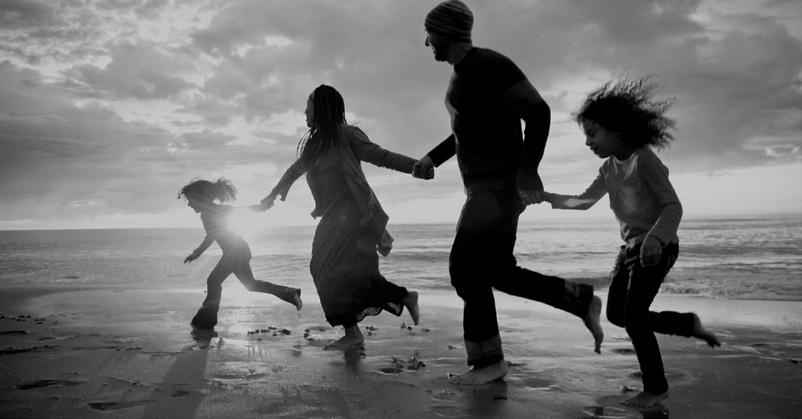


We remain steadfast in our pursuit of cancer prevention and early detection to save lives across all populations.
We believe we can of reduce cancer deaths by 40% by our 50th anniversary in 2035 by investing:
• $20 million in innovative research and technologies to detect cancer early and advance multi-cancer screening.
• $10 million to expand cancer screening and vaccination access to medically underserved communities, bringing hope to those who lack access due to financial, logistical and cultural obstacles.
• $10 million to educate the public about cancer screening and vaccination options—ensuring everyone, everywhere understands the importance of these opportunities to lead long, healthy lives.
The Prevent Cancer Foundation® 32
Your support will help us save lives through cancer prevention and early detection research, education, outreach and advocacy—including through campaigns such as “Back on the Books,” which urges everyone to reschedule cancer screenings and other routine health care appointments that were postponed due to the pandemic.
Each year, nearly 1.8 million Americans receive a cancer diagnosis. Together, we can reduce that number.
THROUGH YOUR GENEROSITY, WE CAN CREATE A WORLD WHERE NO ONE DIES OF CANCER.
Help us reduce cancer deaths and support the Foundation today.
• Give monthly: Reliable funding provides consistent support to our researchers, community grantees and more.
• Make a donation: Every dollar or share of stock you give is an investment in our vision and mission.
• Celebrate a loved one: Pay tribute in honor or in memory of someone dear to you by helping others.
• Plan a gift: Include the Foundation in your will, trust or estate plans to support our work for generations to come.

• Double your donation: Ask your employer if they match charitable contributions.
• Sponsor an event: Host your own event (golf tournament, video game marathon, silent auction, casino night) with friends to raise money.

2021 Impact Report 33
Statement of Financial Position for the Year Ending December 31, 2021
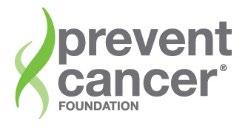
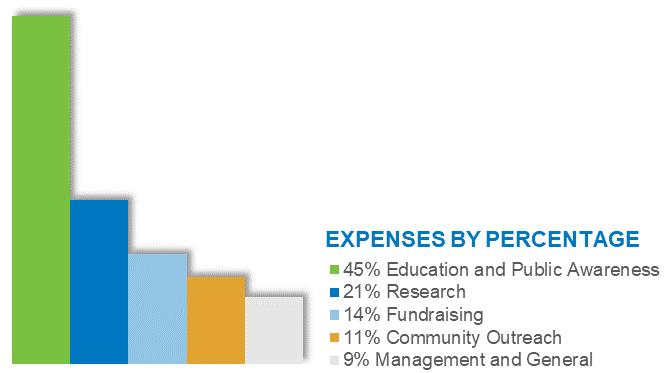
ASSETS LIABILITIES STATEMENT OF ACTIVITIES AND CHANGES IN NEW ASSETS CURRENT ASSETS CURRENT LIABILITIES SUPPORT AND REVENUE Cash and Cash Equivalents 1,748,270 Accounts Payable and Accrued Expenses 201,114 Contributions 2,973,731 Accounts and Pledges Receivable 348,261 Grants Payable, Current 1,286,767 Bequests and Other Income 668,988 2,096,531 Refundable Advances 98,000 Investment Income (Net) 1,597,052 INVESTMENTS Deferred Rent 10,351 In-kind Contributions 63,825 General 6,166,816 1,596,232 Special Events 4,992,129 Donor Restricted and Board Designated 9,602,269 LONG-TERM LIABILITIES Less: Costs of Direct Benefit to Donors (287,315) 15,769,085 Grants Payable, Net of Current Portion 375,000 SBA Paycheck Protection Program loan forgiveness 374,600 PROPERTY Deferred Compensation Plan Liabilities 506,139 TOTAL SUPPORT AND REVENUE 10,383,010 Office Furniture and Equipment 189,259 881,139 Accumulated Depreciation (160,804) EXPENSES TOTAL PROPERTY ASSETS 28,455 TOTAL LIABILITIES 2,477,371 Programs Research 1,750,922 OTHER ASSETS NET ASSETS Education and Public Awareness 3,705,317 Prepaid Expenses 307,264 Without Donor Restrictions 14,163,079 Community Outreach 927,823 Deposits 131,389 With Donor Restrictions 2,483,439 Management and General 710,443 Interest in Remainder Trusts 285,026 16,646,518 Fundraising 1,174,197 Deferred Compensation Plan 506,139 TOTAL EXPENSES 8,268,702 1,229,818 Change in Net Assets 2,114,308 TOTAL ORGANIZATION ASSETS 19,123,889 TOTAL LIABILITIES AND NET ASSETS 19,123,889 Net Assets, Beginning of Fiscal Year 14,532,210 NET ASSETS, END YEAR 16,646,518
Addendum to the Prevent Cancer Foundation's Impact Report 2021
The mission of the Prevent Cancer Foundation is saving lives across all populations through cancer prevention and early detection.
preventcancer.org



















 —Jody Hoyos
—Jody Hoyos





















































































































